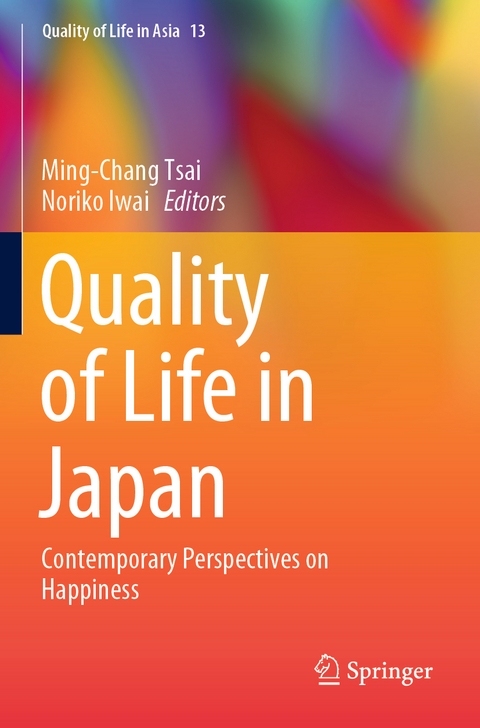
Quality of Life in Japan
Springer Verlag, Singapore
978-981-13-8912-2 (ISBN)
Ming-Chang Tsai is a Research Fellow in Academia Sinica, Taiwan. Working from a comparative sociological approach to life quality research, he concentrates on Asian populations to understand the influences of culture and social structures in how people in this region live happily or unhappily. He receives the Research Fellow Award from the International Society for Quality-of-Life Studies. Noriko Iwai is Director of Japanese General Social Surveys (JGSS) Research Center and Professor of Faculty of Business Administration, Osaka University of Commerce, Japan. Leading the JGSS's Project and East Asian Social Survey Project in past decades, she has been elucidating both the changing and persistent aspects in Japanese people’s social values and behaviours. Besides family studies, the scope of her research has extended to the impact of natural disasters on people’s quality of life.
Part I Introduction.- 1.Quality of Life in Japan: Contemporary Approaches and Analysis.- 2.Happiness in Japan: A Hierarchical Age-Period-Cohort Analysis based on JGSS Cumulative Data 2000-2015.- Part II Income, Poverty and Happiness.- 3.Happiness in Contemporary Japan: Study of Lifestyle and Values Using the Relative Income Hypothesis.- 4.Income, Intra-household Bargaining Power and the Happiness of Japanese Married Women.- 5.Time Poverty and Maternal Wellbeing in Japan.- Part III Aging, Gender, and Migration.- 6.Changes in the Meaning of the Elderly Living with Children: An Analysis of Household Income Inequality among the Japanese Elderly.- 7.Ancestor Worship and Quality of Life: Transforming Bonds with the Deceased in Contemporary Japan.- 8.Intimacy, Similarity, and Equality among Married People in East Asia.- 9.Quality of Life in Japan and Emigration: The Perspectives of Japanese Skilled Immigrants in Australia.
| Erscheinungsdatum | 06.09.2020 |
|---|---|
| Reihe/Serie | Quality of Life in Asia ; 13 |
| Zusatzinfo | 15 Illustrations, color; 22 Illustrations, black and white; VIII, 217 p. 37 illus., 15 illus. in color. |
| Verlagsort | Singapore |
| Sprache | englisch |
| Maße | 155 x 235 mm |
| Themenwelt | Geisteswissenschaften ► Psychologie ► Allgemeine Psychologie |
| Geisteswissenschaften ► Psychologie ► Humanistische Psychotherapien | |
| Studium ► Querschnittsbereiche ► Prävention / Gesundheitsförderung | |
| Sozialwissenschaften ► Soziologie ► Empirische Sozialforschung | |
| Sozialwissenschaften ► Soziologie ► Mikrosoziologie | |
| Schlagworte | Aging population in Asia • Ancestor Worship and Quality of Life • Asian society and quality of life • Elderly’s living condition • Family and well-being • Happiness in Contemporary Japan • Income and Happiness • Intra-household Bargaining Power • Japanese Elderly • japanese immigration • Japanese lifestyle • Lifestyle and happiness • positive psychology • Quality of Life in Japan • Social well-being • Time Poverty and Maternal Wellbeing in Japan |
| ISBN-10 | 981-13-8912-8 / 9811389128 |
| ISBN-13 | 978-981-13-8912-2 / 9789811389122 |
| Zustand | Neuware |
| Informationen gemäß Produktsicherheitsverordnung (GPSR) | |
| Haben Sie eine Frage zum Produkt? |
aus dem Bereich


